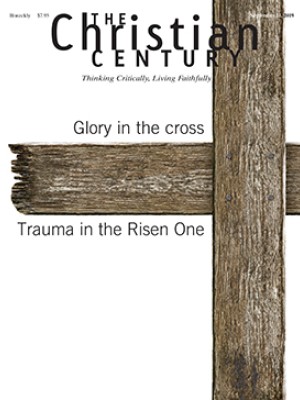September 29, Ordinary 26C (Luke 16:19–31; Amos 6:1a, 4–7)
Conversion narratives raise a question: Why does it take so much to get there?
I love a good transformation story. Saul on the road to Damascus. Augustine stumbling upon Paul’s letter to the Romans. Martin Luther in a thunderstorm. John Wesley after his abject failure in Georgia. All stories about saints of the faith—and egregiously, mostly men.
One of my favorites is Elizabeth Ann Seton, who, through a circuitous route, became the first US-born Catholic saint. When her husband took ill, they sold everything to move to Italy. He died there, and Elizabeth went to mass—where she found purpose and euphoria in the Catholic faith. She came back to the States and—I’m skipping a lot here—sacrificed her most important relationships to become a nun. She started the Sisters of Charity and went on to start several schools, orphanages, and hospitals.
Read our latest issue or browse back issues.
Conversion narratives raise a question: Why does it take so much to get there? I too can remember being in a dark place, without much to lose, before deciding to turn my life over to God. Even that language—“turning one’s life over”—carries with it a sense of the extreme, as if the life that the one who created the universe asks of us is plausible only after exhausting all other possibilities. In recent years we have heard as well of another, similarly extreme sort of conversion: of extremely rich people who decide to give their wealth away, moving from consumption to generosity based on their conviction that they have more than they could possibly spend.
The point is to make whatever change is necessary to get to a place where we use our possessions to benefit others—as Jesus encouraged us in last week’s parable. This week’s story of the rich man and Lazarus is a fairly simple one. But note how Jesus tells it: what he includes, the way characters are framed, and the opportunities that are presented.
First of all there is the awesome presumption that the rich man goes to hell. The story takes for granted that Lazarus is the righteous one, that the rich man is the evil one, and that Lazarus’s hunger while alive is a product of evil from which the rich man benefits. By narrative construction, the rich man is juxtaposed with Lazarus, the position of each made all the more absurd by considering the other. Is it even possible to discuss the circumstances of the poor without also discussing the problem of deep wealth disparity—the fact that not everyone shares their fate—and considering that the size of this gap might be proportional to the amount of evil complicit in creating it? It is known that “blessed are the poor,” but there is more to say about poverty’s relationship to those who do not experience it firsthand.
That Lazarus is named here is also notable. The visceral description of this poor man—his sores, his inability even to stop dogs from licking him—invites us to behold him as more than just one more member of Emma Lazarus’s “huddled masses.” And unlike the rich man, he gets a name. We are accountable for seeing Lazarus—as accountable, perhaps, as the rich man himself. This is a challenge to those among us—regardless of politics—who tend to think of issues but not individuals, who consider people but not persons.
Think of the jarring photograph released in June of the father and daughter drowned in the Rio Grande River while trying to cross the border into the United States. Regardless of your stance on immigration, the image puts in stark relief that this is indeed an issue that affects real lives.
And now give them names: Óscar Alberto Martínez Ramírez and 23-month-old Valeria. These are not hypothetical deaths, and whatever our response is as believers, it should not be purely philosophical.
Think about ministries that want to end homelessness without being in relationship with the homeless people in their neighborhood. Think about the last homeless person you saw and whether you thought about their name or their story. See them, Jesus indicates in Matthew 25, and you see me. In this week’s story, Jesus is pushing us into the vulnerability and risk of relationship. What the rich man misses is not merely a chance to redistribute his wealth but a chance to encounter the living God.
Thankfully, the chasm is not too great for us to overcome nor has it been “fixed” as it has been for this rich man. Even in Hades he wants a dead man to visit his father and five brothers—he knows they won’t convert without being taken to the extreme. But to this request we hear perhaps the mightiest nugget of this story: it shouldn’t take a miracle for us to repent. What we need to do better is right in front of us—no earthquakes, no cancers required—and we should take advantage while we are still in the land of the living.
Amos 6 further illustrates our opportunity—our responsibility—to use whatever we have to take care of one another. As usual, Amos pulls no punches. The folks that don’t live into the mandate to love with our possessions (instead of loving our possessions) will be the first to have their party rudely interrupted. Amos and Jesus are both calling for conversion without extremes: to do the right thing with our possessions simply because it is the right thing to do.






